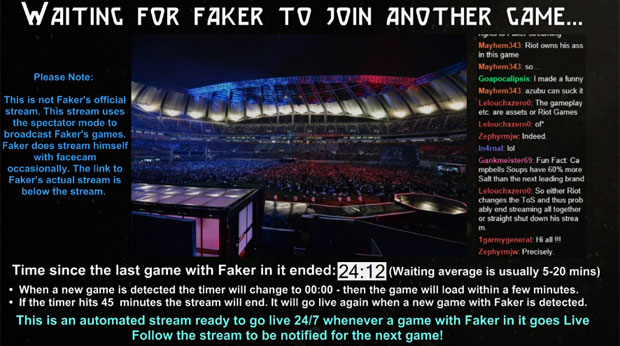Dote Night: SpectateFaker And Riot's Jibber Jabber
Crossing the streams
Screengrab via SpectateFaker stream
Evening all! This edition of Dote Night is about the current content rights argument going on in League of Legends. It revolves around SpectateFaker a Twitch channel set up to stream games featuring the professional player Faker. The channel has been subject to a DMCA takedown order from rival streaming service Azubu and the ensuing argument taps into how streamers can use intellectual property. Here's a summary of what's going on and why it's important.
Riot has a Legal Jibber Jabber page - a set of guidelines online where it lays out what fans can and can't do with its League of Legends intellectual property. A lot of companies have this kind of legal information available so they can let fans know what they can stream or upload and how they're allowed to use the characters in fan projects.
There's a lot of information on the page but the golden rule, as Riot puts it, is that "you can use League of Legends IP as the basis for a fan project that you’re giving away for free or that’s only generating ad revenue". That covers activity like Twitch streaming and YouTube videos. For anything where you're asking people to pay and it's not via advertising you need to get Riot's permission. The other important point is that Riot can deny the use of their IP at any time and for any reason.
Azubu is a video game streaming platform which specialises in eSports. Anyone can watch but, unlike with Twitch, only top players and teams are allowed broadcasting rights. Essentially it's been setting itself up as a premium content platform. Back in September, 2014, Azubu announced an exclusivity deal with the Korean eSports Association where all players on KeSPA teams would stream on Azubu.
As Azubu's director of content, Matthew Gunnin said at the time: "These organizations have never streamed before and have chosen to work exclusively with Azubu to showcase their players and teams in the highest quality possible."
That exclusivity covers a team called SK Telecom T1 and its players including Lee 'Faker' Sang-hyeok – SKT T1's mid-laner. Viewers queried what would happen with unofficial streams during an AMA with Azubu over on the League of Legends subreddit. One question didn't get an answer but summed up something which would become an issue for Azubu:
"There are multiple channels on Twitch streaming Korean pro players. Will you be sending a cease and desist notification to Twitch. Also, note since these channels are making money off of these streams. Will you be filing for financial losses and damages? [sic]"
Another question on similar lines did receive a response. The user asked "There are streams right now that streams Korean pro players like faker on twitch, will you take action to shut down streams like this since they are gaining money from someone's work and not having permission? [sic]"
Gunnin responded "We are working closely with Riot and KeSPA regarding these streams."
Just over a week ago SpectateFaker was hit with a DMCA takedown notice. The person running the stream set up the stream to broadcast games Faker was queuing for and playing solo (i.e. without a pre-made group). Azubu's assertion was that it owned the content SpectateFaker was streaming and that under the Digital Millennium Copyright Act it must be taken down. Twitch complied, removed the relevant content from the account and issued a 24 hour restriction from broadcasting.
The problem here is that the SpectateFaker account wasn't using any content garnered from Faker's own streams or which featured content Azubu would own the rights to (overlays, commentary provided by Faker, music and so on). As the channel owner explained on Reddit, he used a spectator service called OP.GG to access the live spectator view of the games and broadcasted that so as I understand it the content would fall under Riot's ownership and be governed by those rules I mentioned at the start, unless Riot had somehow granted those rights to Azubu.
In the following period there has been a lot of talk. onGamers' Travis Gafford discussed why the takedown is a concern; then Daily Dot had Bryce Blum, a lawyer who specialises in eSports, look at the issues and offer analysis of the situation; there was also a confused response from Riot.
According to the SpectateFaker channel owner, an email from the company on the subject noted:
"If you are going to stream another player's games, it makes sense to reach out to that player first (in this case Faker) and get their permission. It's simply the right thing to do. Raising the visibility of a person's match without their knowledge is questionable because they may be assuming that they are just casually playing a game with friends when in reality they are being broadcast to a larger audience."
To me that feels like a good-faith attempt to answer a thorny question but it doesn't hold up to scrutiny. After all, if you're expected to gain permission from others before streaming a match in which they feature I'd need to speak to every ally and enemy in my games to check they were okay with being streamed, as would the professional players, as would people spectating friends' matches and so on. It flies in the face of the simple rules laid out by Riot, too.
Riot's president, Marc Merrill added a response on Saturday 21 February on Reddit which reiterated the point about wanting to encourage fan-created content and added that Riot is working with its partners to ensure they understand that stance:
"As I think you guys all know, we love the stuff that the community creates and it's important that players feel protected when they put time and effort into creating content for the League community, and as such our legal jibber jabber has always granted players the ability to create content and monetize it on platforms like twitch or YouTube.
"This new issue of rebroadcasting spectator mode streams of a specific player's game is something that only recently became possible and we have to consider very carefully how we address it because this issue involves a bunch of parties. As it relates to addressing the specific issue where third parties use copyright claims against Riot owned content, we are committed to working with our partners to ensure that they understand our stance on player creative content and act accordingly."
Reading through the thread the idea seems to be that Riot wants to stick with its general stance on content creation and is working to ensure their partners understand how that works. But for me it's an awkwardly worded statement. Reading a couple of follow up questions or comments it sounded to me like he was saying that content like the SpectateFaker stream was okay. In light of later comments it sounds like perhaps it was intended as more favourable towards Faker.
For example, a while later he posted to say:
"The more I think about this, the more I'm convinced this is simple exploitation of a loophole that sets a precedent that enables people to stalk / damage players.
"It feels like automated paparazzi. If a player wants to opt-out from automated & TARGETED re-broadcasting, why should we not honor their request?"
But as far as I understand it the channel uses data Riot makes available so would an opt-out option not be something they could add to the game from their end for use in particular situations? It also sounds like it would be worth updating the terms and conditions for broadcasting to take account of those situations if those are Riot's concerns.
He then weighed in with another comment on a Reddit thread by the SpectateFaker channel owner saying that the channel was singling out a player against their will and "reeks of harassment and bullying". He went on to say:
"If you can't see how this potentially harms Faker and/or anyone else in this situation, then that is more reinforcement that we need to take the appropriate action to protect players from this type of unique situation.
"As to the comments about our API, of course we want 3rd party devs to do cool things with spectator. But when people utilize one of its components to harm / harass an individual, then we need to potentially re-evaluate our rules."
I would assume that reading of the situation is related to Faker himself being unhappy with the situation and stating as much to Riot.
As the comments seem contradictory – the first one relatively open and positive and the others are negative and shift in their focus towards issues like harassment and stalking. I've dropped Riot an email to ask whether there's an official position on the matter yet and will update if I hear back.
The SpectateFaker channel admin initially responded to the takedown situation by setting up a channel called SpectateKorea which streamed high Elo games from Korea instead of specifically looking at a single player. They have now resurrected SpectateFaker stating:
"Faker does not have any rights over the game assets. I am streaming game assets - the spectator client, not anything Faker or Azubu owns. It's really that simple.
"I know some people will disagree with this and bring up ethics, but I think this whole issue is about a lot more than Faker. It's about Riot not enforcing their own legal terms of service. It's about a co-owner of Riot Games being completely out of touch with esports and the spectator mode. It's about a company (Azubu) issuing a false DMCA claim for content they didn't even own. These are issues that will affect the future of the game and the spectator mode. All of this needs to be debated for the future of League of Legends and esports."
At present (unless there are rights deals which have hitherto remained private) it seems that the only people who have the right to issue a takedown notice would be Riot themselves. Whether it ends up treated as a harassment issue rather than a content rights issue, the resolution of the SpectateFaker situation (as well as any related change in Riot's approach to who is allowed to use its content) has the power to affect business partnerships, player livelihood streams and the fan community.









